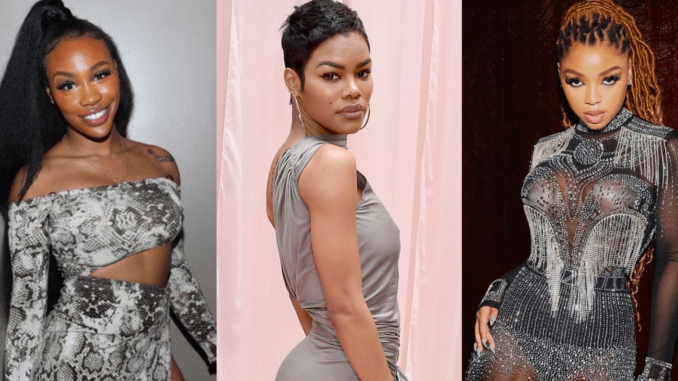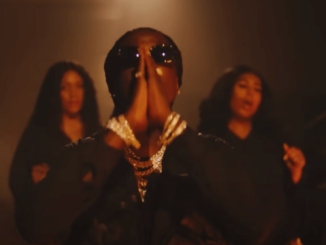
For the first time since its release on the album SOS, SZA’s single, “Kill Bill,” has reached the No. 1 spot on the Billboard Hot 100. The single first debuted on the chart in December 2022 and recently held the No. 4 spot before hitting its peak.
SZA, who is on her first arena tour, dropped a very creative video to accommodate the single, helping promote the provocative song glamorizing the murder of an ex-lover. By April 2023, a remix of “Kill Bill” consisted of a feature from artist Doja Cat, driving enthusiasm for the single to a new heightened level.
Sure, “Kill Bill” made it to its deserving destination at the No. 1 spot eventually, but all the hoops that SZA had to jump through to get the single there in spite of being on a reputable label and having an impressive resume hints at a more than apparent issue in the music industry and among R&B fanbases.
The recent interviews of R&B talents Teyana Taylor and Chloe Bailey further point to the major neglect of R&B singers. On Angie Martinez IRL, Taylor spoke about the lack of support from other women and the industry as a whole, although she speaks highly of Beyonce as a preliminary mentor in the infantry of her budding career.
“I always felt like we scream and yell and holla about women empowerment, but we’re not really empowering one another behind closed doors,” Taylor said on the podcast. “At this point, women empowerment is for an aesthetic.”
In reference to her time under Star Trak Entertainment, the label banner of fellow artist Pharrell Williams, she admits that she was placed in a vulnerable position and needed for him to “push for her more.”
Taylor continues, “A lot of hands started going into the cookie jar…to me, as a 15-year-old, it was you didn’t protect me. You let everybody mishandle me when I signed to you.”
The lack of support and push behind her projects has been ongoing throughout Taylor’s music career, and that’s even with the backing of hitmakers Chris Brown and Kanye West in their peaks and prior to them experiencing their own public woes. Taylor would eventually retire from music and pursue acting and directing.
Interestingly enough, it’s the same issues that SZA experienced before the release of SOS, her second studio album the followed the multi-platinum debut Ctrl. In 2016, SZA posted on Twitter that she was quitting music because of the many hurdles she was experiencing with obtaining the necessary attention for her career as the only female on the T.D.E record label. By 2020, her thoughts about the industry were still abysmal.
“I feel like I’m in a cage,” SZA said in an interview with Flaunt Magazine. “I’m making the best album of my life for this next album and I know that…because it’s going to be my last album.”
Chloe Bailey isn’t having it any easier. Just a year ago, she was surfing on the high tides of success stemming from the release of her solo entry, “Have Mercy,” gaining over 95 million views for its YouTube video.
Fast forward to Bailey’s latest project, In Pieces, which includes singles “Pray It Away,” the Chris Brown assisted “How Does It Feel,” and “Cheatback” featuring Future, and the videos are barely cracking 15 million views combined. Like Taylor and SZA, Bailey has decidedly diversified her options through acting, a smart strategy at an unsettled time like this.
Bailey went on to The Breakfast Club and discussed the lack of support as she continued to embrace her adulthood and sensuality.
“Once I found confidence and my power within that, people would then try to weaponize it because no one ever likes to see a Black woman be confident within herself,” Bailey said. “Once you claim that, it’s a problem.”
A problem that disproportionately impacts artists of a certain demographic, in a certain genre of music. Read between the lines. It’s unfortunate because historically the music world has managed to produce greats, such as Natalie Cole, Chaka Khan, Diana Ross, Gladys Knight, Whitney Houston, Aretha Franklin, Betty Wright, Gloria Gaynor, Patti LaBelle, and so many others, during eras when the gender, racial and social-economic climates were supposedly more restrictive for people of color and women.
To be fair, the record labels are navigating turbulent times. It wouldn’t be far-fetched to blame less attentive labels on the setback of the pandemic, the threat of an A.I. technology takeover, and watered-down revenue and profits that parallels with various online alternatives for music access.
The record labels may just be trying to stay afloat. Essentially, the weight of pushing the brand and music falls on the artist, and if they’re not creating favorable buzz in the opinion of fans then the artist may never catch on.
Speaking of fans, social media has enabled an entire mess hall of opinions as catalysts for swaying support. One day they love you, the next day they don’t, and that rule applies to even the bigger superstars, such as Beyonce, Rihanna, and Lizzo.
It’s an exhausting battle for artists who are trying to balance the tricky beam of satisfying fans while also staying true to their artistry. If artists are conservative, they are labeled boring. If artists are very liberal in their sexuality, they are part of an agenda or “doing too much.”
The industry and artists have to take some accountability. This is what happens when gimmicks overrule talent. Topping one’s self becomes quite the impossible mission and it leads to fans believing that the artist is disingenuous.
To solve the issue of the music industry being an unsupported space for female R&B artists, women will have to activate the empowerment they seek. Activation comes in the form of being courageous enough to not compromise their personal values for the sake of shock value, and to expose the culprits that violate women in the dark crevices of the industry, whether that violation manifests as sexual and financial abuse or career neglect.
By taking the reigns, female R&B artists would not be coerced into extorting themselves in ways unaligned with their true appeal. The assumption of power may not change those who will forever view music through a racist or colorist lens, but the industry will have no choice but to fall in line with what’s available. As for the fans…it all comes down to the artists finding a vibe tribe and sticking with them.



